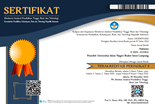Hubungan Antara Dukungan Sosial dan Religiusitas dengan Resiliensi Pada Penyintas Tsunami di Desa Way Muli Lampung Selatan
Abstract
Resilience is an individual's ability to cope with and to face and be able to respond positively to unpleasant conditions. Individuals who have resilience in their lives are individuals who are able to survive in their life even though they are under stress, even in adversity or trauma that they have experienced in life. This study aims to determine the relationship between social support and religiosity with the resilience of tsunami survivors. The hypothesis put forward is that there is a positive relationship between social support and religiosity with the resilience of tsunami survivors. The subjects of this study were the people affected by the tsunami in Way Muli Village, South Lampung. The sample in this study was 50 people. The sampling technique used purposive random sampling. The research data were collected using a Resilience Scale. Social Support Scale. Religiosity Scale. The Resilience Scale consists of 36 valid items with a reliability coefficient of 0.920. The Social Support Scale consists of 43 valid items with a reliability coefficient of 0.936. The Religiosity scale consists of 26 valid items with a reliability coefficient of 0.928. Data analysis using multiple regression analysis techniques. The results obtained were Rx1.2y = 0.812 with a significant 0.000 (p <0.01). This means that there is a positive relationship between social support and religiosity with the resilience of tsunami survivors. The value of r2 = 0.659 means that in this study social support and religiosity only contributed 65.9% to resilience.
Keywords
Full Text:
PDFReferences
Aflakseir, A., & Coleman, P. G. (2011).Initial development of the Iranian religious coping scale.Journal of Muslim Mental Health.Vol 2.44-59
Akbar, Z., & Tahoma, O. (2018). Dukungan Sosial dan Resiliensi Diri pada Guru Sekolah Dasar. JPPP-Jurnal Penelitian dan Pengukuran Psikologi.vol 7. No 1.53-59.
Amawidyati, S. A. G., & Utami, M. S. (2007). Religiusitas dan psychological well‐being pada korban gempa. Jurnal Psikologi. Vol 34. No 2. 164-176.
Ambarani, S, A, D. (2019). Hubungan Antara Dukungan Sosial Dengan Resiliensi Pada Janda Cerai Mati. Skripsi. Fakultas Psikologi. Universitas Sanata Dharma Yogyakarta:Yogyakarta.
Arikunto, S. (2006). Prosedur Penelitian Suatu Pendekatan Praktik. Jakarta: Rineka Cipta.
Azwar. 2007. Metode Penelitian. Pustaka pelajar: Jakarta
______. (2014). Penyusunan Skala Psikologi Edisi II. Yogyakarta : Pustaka Belajar.
______. (2017). Reliabilitas dan Validitas Edisi 4. Yogyakarta : Pustaka Belajar.
Azam, et al.2011. Impact of 5-D of religiousity on diffusion rate of innovation. International Journal of Business and social science
Cahyaningrum, S.A (2014). Pengaruh dukungan sosial dan religiusitas terhadap resiliensi remaja di desa kutruk, Jambe, Tangerang. UIN Syarif Hidayatullah. Jakarta
Connor, K. M, Davidson, J.R.T. (2003). Development of a new resilience scale: The connor-davidson resilience scale (CD-RISC). Journal of Depression and Anxiet,.18, 76-83
Connor, K.M.2003. Development of a new resilience scale; article in depresion and anxiety
Difa, F, S. (2016). Pengaruh kecerdasaan emosi dan dukunganan sosial terhadap resiliensi mahasiswa perantau uin syarif hidayatullah jakarta. Journal of Psychology. Vol 4. No 2.
Deswita. (2006). Psikologi perkembangan. Bandung. Remaja Rosdakarya.
Fitriani, A. (2016). Peran religiusitas dalam meningkatkan psychological well being. Al-Adyan: Jurnal Studi Lintas Agama. Vol 11. No 1.57-80.
Fetzer Institute and National Institute on Aging Working Group (1999). Multidimensional measurement of religiousness, spiritual for use in health research. Fetzer Institute in Collaboration with the National Institute on Aging. Kalamazoo.
fidinillah, Q. (2018). Hubungan Religious Coping Dan Resiliensi Pada Remaja Korban Bencana Banjir Dan Tanah Longsor Di Pacitan. Skripsi. Fakultas Psikologi. Universitas Muhammadiyah Malang: Malang
Hadi,S. (2000). Metodelogi Penelitian. Yogyakarta : Andi Yogyakarta.
Hasanah, M. (2019, July). Hubungan antara religiusitas dengan resiliensi santri penghafal al-qu’ran di pondok pesantren. In Proceeding National Conference Psikologi UMG 2018.Vol 1. No. 1. 84-94.
Indriani, M. (2018). Resiliensi Remaja Korban Perceraian Orang Tua. Skripsi. Faukltas Psikologi. Universitas Islam Negeri Maulana Malik Ibrahim Malang:Malang.
Iqbal, M. (2011). Hubungan antara self-esteem dan religiusitas terhadap resiliensi pada remaja di Yayasan Himmata.
Jannah, N. (2018). Hubungan Antara Hardiness Dengan Resiliensi Pada Narapidana Di Lembaga Pemasyarakatan Klas Ii A Perempuan Malang. Skripsi. Fakultas Psikologi. Universitas Muhammadiyah Malang: Malang
Karyanta, N. A., & Satwika, P. A. (2016). Hubungan antara Regulasi Emosi dan Religiusitas dengan Resiliensi pada Ibu yang Memiliki Anak Tunagrahita di SLB C YPSLB Kerten Surakarta. Wacana. Vol 3. No 2.
Kumar, R. 2005. Research Methodology: A step by step guide for beginners: 2nd edition. Singapura : Pearson education
Linawati, R. A., & Desiningrum, D. R. (2018). Hubungan antara religiusitas dengan psychological well-being pada siswa smp Muhammadiyah 7 Semarang. Empati. Vol 6. No 3.105-109
Marni, A., & Yuniawati, R. (2015). Hubungan antara dukungan sosial dengan penerimaan diri pada lansia di Panti Wredha Budhi Dharma Yogyakarta. Empathy, 3(1), 1-7
Merdeka.com diakses pada tanggal 13 Agustus 2019, pukul 21.35
Munawaroh, M., & Khisbiyah, Y. (2018). Hubungan Antara Religiusitas Dan Tingkat Stres Terhadap Strategi Coping Pada Santri Pondok Pesantren. Skripsi. Fakultas Psikologi. Universitas Muhammadiyah Surakarta : Sukarta.
Reivich, K., & Shatte, A. (2002). The Resilience Factor: 7 Essential Skills for Overcoming Life’s Inevitable Obstacle. New York: Broadway Books.
Resnick, et al. Resilience in aging: concepts, research, and outcomes. London; Springer science Business Media, Inc.
Riza, dkk. (2012). Resiliensi pada narapidana laki-laki di lapas kelas 1 medaeng. Jurnal kepribadian dan sosial
Sarafino, et al. 2011. Health Psychology. John Wileys. USA
Satria, B., & Sari, M. (2017). Tingkat resiliensi masyarakat di area rawan bencana. Idea Nursing Journal. Vol 8. No 2. 30-34
Septia, H. (2018). Hubungan Dukungan Sosial Teman Sebaya Dan Resiliensi Remaja Korban Bencana Di Pacitan. . Skripsi. Fakultas Psikologi. Universitas Muhammadiyah Malang: Malang
Octaryani, 2017. Pengaruh Dukungan Sosial terhadap Resiliensi Petugas Pemadam kebakaran DKI Jakarta. UIN Syarif Hidayatullah. Jakarta
Sudaryono. (2018). Metode Penelitian Edisi Satu Cetakan 2. Depok: Rajawali.
Sugiyono.(2012). Memahami Penelitian Kuantitatif. Bandung : ALFABETA
Suwarjo. 2008. Model Pengembangan Resiliensi. Yogyakarta: Jurusan Psikologi Pendidikan dan Bimbingan FIP UNY.
Wagnild, et al. 1993. Development and psychometric evaluation of the resilience scale. Journal of Nursing measurementWeiss, R.S. (1974). The Provisions of Social Relationship. Englewood Cliff: Prentice Hall.
DOI: http://dx.doi.org/10.24042/ajp.v4i1.13198
Refbacks
- There are currently no refbacks.
Copyright (c) 2022 ANFUSINA: Journal of Psychology













